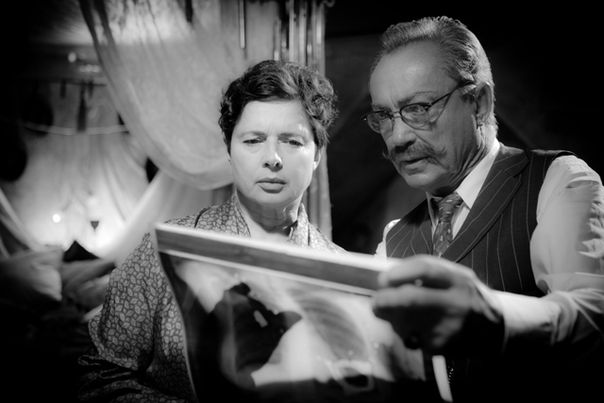Odysseus with Woman-shaped-Tiresias in his arms
An abundance of classical-literature references doesn't redeem KEYHOLE's gimmicky experimentalism.

Guy Maddin's KEYHOLE
Guy Maddin‘s new movie KEYHOLE is a gangster odyssey. Ulysses, the chief of the gang, is awaited by his band in an old creepy house, which is surrounded by the police, attacking from the outside, while screaming ghosts haunt them inside. Their mission is not known to us and they have a boy tied up as a hostage. Nobody seems to know who the boy is, and they just wait for orders.
As in Homer‘s Odyssey, Ulysses is there on a selfish mission, trying to get back to his wife – not Penelope, though, but Hyacinth (Isabella Rossellini). To achieve his objective he needs to embark on a supernatural voyage, in which he deals with ghosts and mistakes from his past. To help him, he enlists the assistance of a young woman, who seems to have been brought back from the underworld, just like the Greek Odysseus when he goes to Hades in search for Tiresias’ advice. The young blind woman (again, like Tiresias, who was blinded and transformed into a woman by the gods) is an oracle, who helps him connect with his past as well as with his progress through the house.
Homer’s Odysseus uses his crew to face the unknown forces of nature and the gods, so does Maddin’s Ulysses. He‘s the only one who can face the ghosts because he uses everyone to achieve his objectives. He takes advantage of both their obedience and their ignorance, and by the end, it seems his gang has the same unfortunate fate as Odysseus‘ crew.
Even though the literary reference is a point of interest in KEYHOLE, Guy Maddin‘s all too familiar experimentalism seems a bigger mannerism than usual. The film has a linear narrative structure, making the usual superimpositions look completely out of place. The movie tries to work as some kind of puzzle, and those “experimental“ layers – images repeated one over the other – only induce a headache. As with Guy Maddin‘s other movies, this stylistic device is rather calculated, working more as a visual effect than reemitting something substantial to the composition of the movie.


301 Moved Permanently